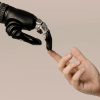We’ve all encountered it before: The occasional robot test that feels impossible to beat. If you’ve felt like these tests, also known as CAPTCHAs, have gotten harder in the last couple of years, you aren’t wrong—and the reason is as ironic as it is baffling.
Simply put, AI are just as good as—and often better than—humans at completing CAPTCHAs in their classic format. As machine learning and AI become more advanced, the fundamental human attributes that make consistent CAPTCHA formats possible become less impactful, raising the question of how to determine the difference between AI and humans in the future.
The biggest barrier to universal CAPTCHA doctrine is purely cultural. Humans may share experiences across the board, but such experiences are typically basic enough to fall victim to the same machine learning which has rendered lower-level CAPTCHAs moot. Adding a cultural component to CAPTCHAs could prevent AI from bypassing them, but it also might prevent some humans from understanding the objective.
Therein lies the root of the CAPTCHA paradox. Humans are far more diverse than any one test can possibly account for, and what they do have in common is also shared by—you guessed it—AI. To create a truly AI-proof test would be to alienate a notable portion of human users by virtue of lived experience. The irony is palpable, but one can only imagine the sheer frustration developers are going through in attempting to address this problem.
But all isn’t lost. While litmus tests such as determining the number of traffic cones in a plaza or checking off squares with bicycles (but not unicycles, you fool) may be beatable by machines, some experts posit that “human entropy” is almost impossible to mimic—and, thus, a viable solution to the CAPTCHA paradox.
“A real human being doesn’t have very good control over their own motor functions, and so they can’t move the mouse the same way more than once over multiple interactions,” says Shuman Ghosemajumder, a former click fraud expert from Google. While AI could attempt to feign this same level of “entropy”, the odds of a successful attempt appear low.
Jack Lloyd has a BA in Creative Writing from Forest Grove's Pacific University; he spends his writing days using his degree to pursue semicolons, freelance writing and editing, oxford commas, and enough coffee to kill a bear. His infatuation with rain is matched only by his dry sense of humor.











































Pingback: The CAPTCHA is officially outdated, there, we said it